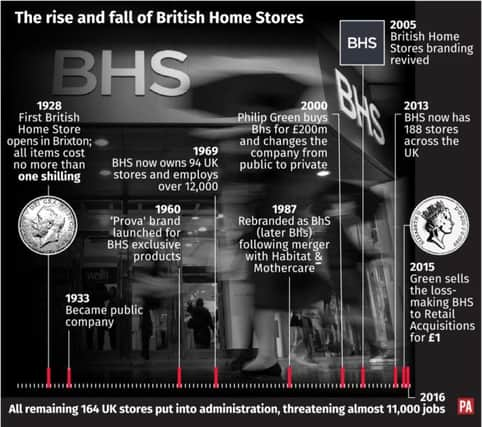BHS name will disappear from high street as cherry-pickers gather


Analysts said administrators are highly unlikely to find a single buyer for the chain, which has underperformed for years.
Phil Dorrell, partner at Retail Remedy retail consultants, said BHS stores in prime high street locations are likely to be cherry-picked, leaving the rest in doubt.
Advertisement
Hide AdAdvertisement
Hide Ad“There won’t be a retailer to buy BHS wholesale,” said Mr Dorrell.
“Expect a piecemeal sale of specific sites in strategic locations to John Lewis possibly or Sports Direct or Next. Sadly this is probably the beginning of the end for BHS on our high streets. It would take a brave and innovative business to buy the brand and turn it into an ongoing concern.
“The problem is their trading offer is in the 1980s. Their stores look a bit dated. They are behind the times.”
Advertisement
Hide AdAdvertisement
Hide AdNick Hood, business risk adviser at the insolvency practitioners Opus, said the BHS crisis has “awful echoes” of Woolworths’ demise and the options for the chain are “distinctly limited”.
Like Mr Dorrell, he believes that BHS’s profitable stores will be cherry-picked and singled out Sports Direct as a possible buyer for the best sites.
Mr Hood said BHS has suffered from years of underinvestment and has lost over £400m over the last six years.
“Retail these days is all about heavy investment in staying up with the trend, online offerings, mobile offerings. None of this has happened at BHS,” he said.
Advertisement
Hide AdAdvertisement
Hide Ad“This has awful echoes of the demise of Woolworths - another retail business that didn’t stay up with the times.
“Ultimately, we’ve got 11,000 jobs at risk here and the pensions of 20,000 people. It’s a disaster. The pension fund currently faces a £576m deficit.”
Analysts said that BHS has suffered from years of under investment and is seen as a store for baby boomers - people born between 1946 and 1964 - rather than the under 50s.
Dr Gordon Fletcher of the University of Salford said BHS has failed to keep up with retail trends.
Advertisement
Hide AdAdvertisement
Hide Ad“The utilitarian model of retailing everything within one physical store simply does not appeal to younger generations and along with the soaring cost of servicing pensions, the fate of this stalwart appears sealed,” said Dr Fletcher.
“Being cheap, but not cheap enough to compete, coupled with being a landmark brand while not offering anything distinctive produces that particularly bland region of retailing that BHS has increasingly occupied.“
A buyer for BHS, which has 164 stores and 14 in Yorkshire, would face huge hurdles. The retailer has a £571m pension deficit, a £1.3bn debt pile and it has lost money for the last seven years
TopShop owner Sir Philip Green sold the firm for £1 in 2015 to Retail Acquisitions, a group of financiers, lawyers and accountants, who failed to raise new capital to reverse the losses.
Advertisement
Hide AdAdvertisement
Hide AdThe crisis at BHS highlights wider problems in the retail sector.
BHS THROUGH THE YEARS
British Home Stores was founded in 1928 by a group of American entrepreneurs.
The group expanded rapidly in the 1970s and in 1980s its name was changed to BhS, then Bhs and eventually BHS.
In 2000, retail billionaire Sir Philip Green bought the chain for £200m, but by 2005 BHS was losing out to cheaper rivals such as Primark.
It made a cash loss of £21m in the year to August 2014.
Advertisement
Hide AdAdvertisement
Hide AdIn 2015, Retail Acquisitions bough BHS for £1 and began on a turnaround plan to try and bring it back into profitability.
The chain was thrown a lifeline in March when creditors back two company voluntary arrangements.
The firm went into administration on Monday.